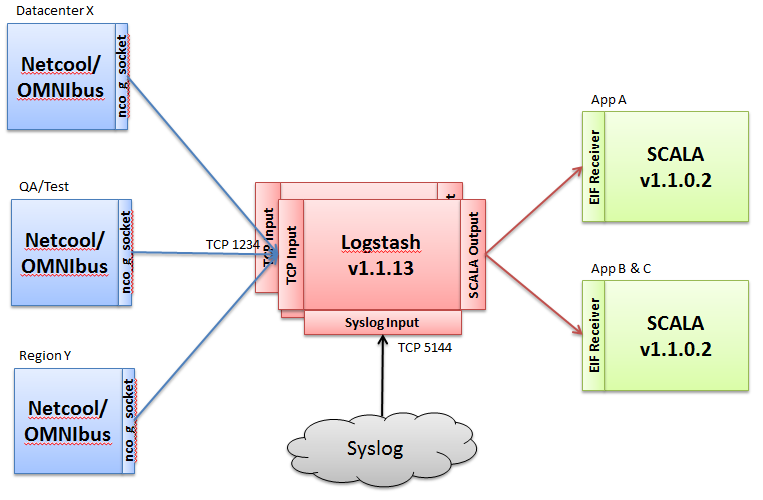Read part one of this blog series here.
Here’s an overview of what we’re building a slice of. You can simply start with what you have but you can see how this can be stamped out cookie cutter style to support many different architecture patterns in your environment. In larger environments there are obvious scale and performance considerations that should be considered for each component in the flow. Fortunately, each component has decent capabilities for filtering and throttling down event flow load.

What’s Required
- SCALA v1102 core application
- SCALA v1100 DSV Tool Kit
- SCALA v1100 Logstash Tool Kit
- Logstash v1.1.13 (we don’t support the v1.2.x version yet)
- Netcool/OMNIbus Socket Gateway (Netcool/OMNIbus Gateway for Socket (nco-g-socket 10_0) for Linux – English (CI5FZEN)) – download from your authorized source.
- Familiarity with your Netcool/OMNIbus alerts.status schema
- Familiarity with common gateway configuration steps such as editing the .props file, socket map file and socket.reader.tblrep.def
- Netcool/OMNIbus (any version should work)
- Servers – doesn’t everyone have these lying around now?
SCALA v1102
Let’s start with getting SCALA installed and in place. I’ve talked a number of times on the basics of installation of SCALA. It’s been designed to be as simple and quick as possible so I won’t spend time here on this.
Download the following:
- SCALA v1102
- DSV Toolkit v1100
- Logstash Toolkit v1100 (we’ll install this later)
My preferences are to create a user and group named ‘scala’ and to install into a directory named ‘/opt/scala’ which contains a directory for ‘builds’ (software packages, etc.) and one for ‘driver’ (the install target). I always install via the console or silent install process and simply point to my preferred install target.
For the DSV Toolkit, copy the zip file to the [SCALA_HOME]/unity_content directory and unpack it. You’ll end up with a [SCALA_HOME]/unity_content/DSVToolkit_v1.1.0.0/ directory.
We’re all set with the basics and we’ll come back and configure things in more detail in an upcoming post. The next post will focus on the installation of Logstash v1.1.13.
